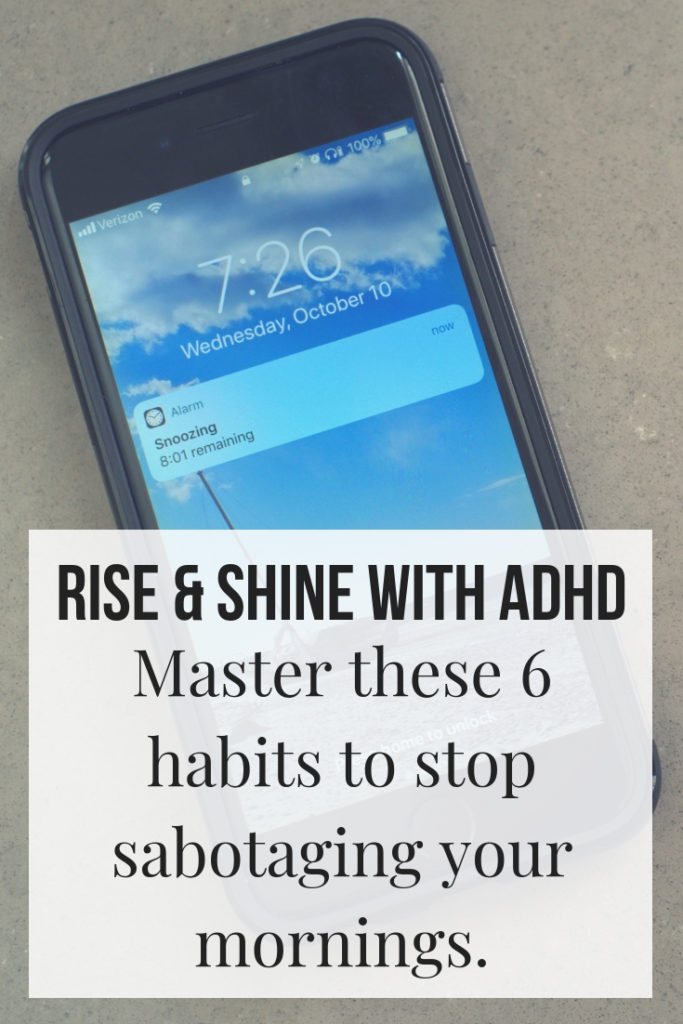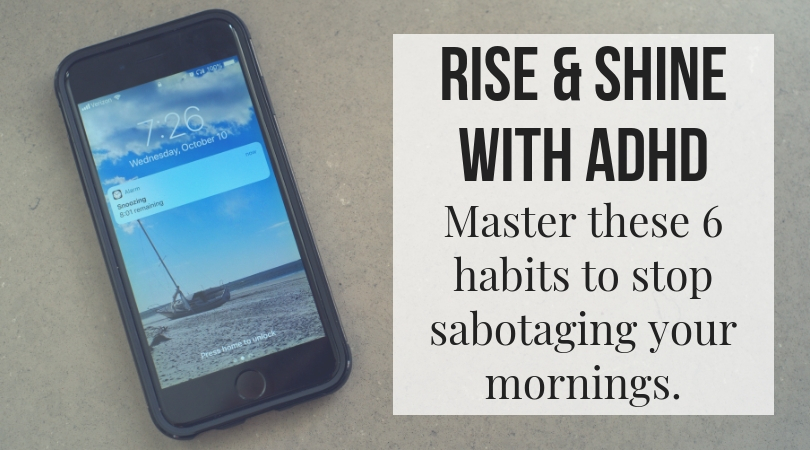Last week, we explored a step-by-step approach to creating a morning routine. But what happens when you keep messing it up? Or when someone else in your household keeps sabotaging your efforts?

People with ADHD need to be intentional about how we manage our time and plan our days. But we also need more than structure alone. A friend recently asked if I still take medication for my ADHD, or if I’ve learned to manage it with extra structure and planning. This illustrates an important misconception: that we manage ADHD’s effects either by changing our brain or by using external coping mechanisms. Most of us need a little of both.
If your morning routine keeps failing, your brain may be struggling to keep up. Reasons range from sleep deprivation to doing too much and delegating too little. But you may also need to introduce a new tool. You need to troubleshoot constantly.
Try these strategies to get your mornings on track:
Get a good night’s sleep.
Many people with ADHD have trouble getting to bed on time, falling asleep, and staying asleep. This can make it hard to get out of bed in the morning. If you sleep through your alarm, you’re setting yourself up for stress and chaos.
That’s not the only reason to prioritize good sleep hygiene. Chronic sleep deprivation can create symptoms very similar to ADHD in neurotypical brains. If you’re already struggling with ADHD, it will make your symptoms worse. Even if you manage to drag yourself out of bed on time, you’ll have a much harder time getting through your morning routine successfully.
If you aren’t getting enough high-quality sleep, make it a priority to change that. Here are some common strategies to improve your sleep:
- If you’re a restless sleeper, try sleeping under a weighted sensory blanket.
- Stop using screens two hours before bedtime, and try using dimmer, warmer lighting in your home after dark.
- If you do have regular screen time before bed, try a pair of blue light glasses or installing an app to adjust your screens’ brightness and color balance.
- Ban blue-light-emitting devices from your bedroom. That means LCD screens, laptops, phones, televisions, and anything that keeps a light on while you’re sleeping.
- Invest in blackout curtains or thick blinds to keep your room dark, and try to keep it relatively cool (excessive heat affects your sleep).
- Identify your hyperfocus triggers and try to avoid these activities starting an hour or two before bedtime.
Don’t be afraid to make a list.
People with young children often create a visual reminder of the morning routine. As an adult, you may feel silly posting a list of responsibilities on the wall. If you keep forgetting something or getting flustered, or if you’re trying to adapt to a new routine, a list might be just the thing.
It doesn’t have to look childish. You could even hide it on a sticky note inside your medicine cabinet. The important thing is to get everything out of your head and onto a piece of paper. ADHD’s impact on working memory (the ability to keep more than one thing in our brains at once) can make it impossible to wrap our brains around a simple morning routine — unless we write it down.
Do things in the same order every day.
I started doing my morning routine in the same order every day as a teenager. Like most teens, I dreaded forgetting my deodorant — and it happened a lot more often when I did my routine out of order.
When we engrain a process deep in our brains, we can run on autopilot and give our executive functions a rest. Just watch for disruptions: that’s when you’re most likely to forget something important.
Make it fun.
Just because the individual tasks are a drag doesn’t mean your morning routine has to be a drag. Whenever I find myself resisting a tedious chore like loading the dishwasher or even shaving my legs, I put on music or a podcast. I’ve written about this in my monthly ADHDgram newsletter: podcasts can make a person of any age forget they’re doing a chore. Ask any adult in your life, and you’ll probably receive a long list of favorite podcasts they think you need to hear. For kids, we particularly love Story Pirates, But Why, and Spare the Rock, Spoil the Child.
People of all ages will also appreciate a reward for getting ready early. Do something fun when you finish ahead of schedule. I like to read a book. My son likes a little extra time to play video games. Just make sure you set a timer, and avoid anything where time will completely get away from you even with the timer blaring in your ear.
Give others responsibility for their stuff.
If other members of your household can do parts of their morning routine for themselves — or help with tasks that benefit everyone, like feeding the dog or loading the dishwasher — let them. Better yet, expect them to pull their weight.
As a parent, I see many other parents doing for their children what those children can likely do themselves. This doesn’t just contribute to your exhaustion. It also strips your kids of an opportunity to build independence and self-worth. For kids with ADHD, appropriate levels of independence and responsibility will help them learn how long things take in the morning.
When you put your kids (and spouse) in charge of their own parts of the family’s morning routine, don’t let them sabotage you getting out the door. Let your kids take the bus to school instead of getting a ride from you (bonus: you can help them learn not to miss it). If you do carpool to school or work, leave when you say you’re going to leave. If that means someone runs to the car with their shoes in their hand, so be it. If someone goes to school in their pajamas, so be it. If someone has to eat a granola bar in the car because they slept through breakfast…so be it. Don’t set yourself up as a person who will sacrifice your morning to bail others out or wait indefinitely when people run late.
Troubleshoot nonstop.
If your morning routine isn’t working, don’t assume it’s you who needs to change. You won’t. You are who you are, your brain is what it is, and you’ll waste a lot of energy (and sanity) fighting against yourself every day. When things aren’t working, it’s the system or the environment that needs to change, not you.
That means you need to stop beating up on yourself for not having it together. You aren’t a failure, you just haven’t found the right formula yet. The sooner you drop the judgement and start taking a more scientific approach, the sooner you’ll get on your way to engineering a better morning.
Hey there! Are you enjoying The ADHD Homestead?
Here's the thing: I don't like ads. I don't want to sell your attention to an advertising service run by the world's biggest data mining company. I also value my integrity and my readers' trust above all, which means I accept very few sponsorships/partnerships.
So I'm asking for your support directly. For the cost of one cup of coffee, you can help keep this site unbiased and ad-free.
Below you will find two buttons. The first lets you join our crew of Patreon pals and pledge monthly support for my work. Patrons also have access to my Audioblogs podcast. The second takes you to a simple donation page to pledge one-time or recurring support for The ADHD Homestead, no frills, no strings. Do whichever feels best for you!

